[Dec 2007, Volume 4 Quarterly Issue] Pdf File size - The IIPM Think ...
[Dec 2007, Volume 4 Quarterly Issue] Pdf File size - The IIPM Think ...
[Dec 2007, Volume 4 Quarterly Issue] Pdf File size - The IIPM Think ...
You also want an ePaper? Increase the reach of your titles
YUMPU automatically turns print PDFs into web optimized ePapers that Google loves.
TENANCY REFORMS<br />
cent in kind or cash of the gross produce<br />
of the land. A Report on An Enquiry<br />
into the Working of Orissa Tenants’<br />
Protection Act, 1948, and Orissa Tenants’<br />
Relief Act, 1955 in Five Districts of<br />
Orissa, 1970 by B. Mishra revealed that<br />
payment of rent receipt was not received<br />
by 80 percent of the tenants.<br />
It is interesting to note that even as<br />
the Report states that although the tenants<br />
were fully aware of O.T.R. Act,<br />
1955 only one tenant filed a case and the<br />
case ultimately cost the tenant Rs.130/-<br />
and the decision finally went against<br />
him. Further the Orissa Land Reforms<br />
Committee, 1980, brings to the limelight<br />
the existence of a vast number of tenants<br />
mostly unrecorded sharecroppers<br />
who have neither taken any legal steps<br />
through applying revenue officers to get<br />
ryoti right nor the revenue officers empowered<br />
to initiate actions at their own<br />
level endeavoured to confer ownership<br />
rights on tenants. <strong>The</strong> tenants also do<br />
not dare to agitate in order to promote<br />
their case because of the fear of retaliation<br />
by the ryoti type of landlords. Thus<br />
various legislation enacted and subsequently<br />
modified from time to time in<br />
the better interest of tenants could not<br />
yield desired result so far. However generalisation<br />
of findings of the Report on<br />
the basis of observation in only three villages<br />
would be improper and it is needless<br />
to say that further detailed empirical<br />
studies need to be undertaken for seeking<br />
definitive and conclusive judgment<br />
on this aspect.<br />
With regard to working of O.L.R.<br />
Act, 1960, also the experiences are not<br />
so encouraging. To substantiate such a<br />
stand in this regard two principal aspects<br />
need to be empha<strong>size</strong>d. Firstly,<br />
the response from the tenants to claim<br />
occupancy rights, as stressed in O.L.R.<br />
1960, was not satisfactory. Even though<br />
under Section 36-B, the Revenue Officer<br />
was empowered to take appropriate<br />
action in case of any application not<br />
received from tenants the result lagged<br />
far behind expectation. Secondly, as<br />
is evident from O.L.R. Act 1960, the<br />
landlords have been doubly compensated<br />
for their property right over land<br />
once by the Government in the case of<br />
abolition of estates and by fixing Rs 800<br />
per standard acre for tenants to acquire<br />
land vide amendment effected to 1965<br />
Act, for the second time. As the tenants<br />
were subjected to grinding poverty they<br />
failed to acquire the land they cultivated<br />
for want of funds required to pay the<br />
compensation fee. Further, the apparent<br />
inequity evident in the O.L.R. Act 1960,<br />
relates to the payment of heavy premium<br />
to the Government on one hand and receipt<br />
of application from tenants by the<br />
Revenue Officer with respect to getting<br />
proprietary rights within a short period<br />
of 90 days on the other.<br />
Thus heavy compensation fee and premium<br />
coupled with short period of time<br />
to get proprietary rights reveal deliberate<br />
and unjust attempts of legislators to<br />
safeguard the interest of the landowning<br />
class. As a result uptil now oral tenancy,<br />
without any records whatsoever, along<br />
with high rent and insecurity of tenure<br />
do outline the prevailing tenancy system<br />
in Orissa. Such an unfortunate trend has<br />
crept in the agrarian structure of Orissa<br />
not because the tenants lack awareness<br />
of various tenancy legislation but<br />
because the prevailing socio-economic<br />
conditions do not possibly allow exercising<br />
their rights in this regard.<br />
With the provision of resumption of tenanted lands on the<br />
grounds of so-called “personal cultivation” being not defined<br />
clearly by many states, a lot of tenants were subjected<br />
to eviction on a large-scale basis. Many tenants after<br />
conferment of ownership rights either sold or mortgaged it<br />
V. Conclusion<br />
Thus to sum up, different tenancy legislation<br />
and consequent regulations incorporated<br />
in them failed to serve the<br />
very purpose of bringing socio-economic<br />
justice to the poor tenants and thereby<br />
establishing an egalitarian society. With<br />
an exception to few financially better-off<br />
tenants who were in a position to vindicate<br />
their cause, the hardships and sufferings<br />
of tenants in general continued.<br />
Several reasons may be cited in this regard<br />
as to why these tenancy legislation<br />
did not yield desired results.<br />
To mention a few, firstly, there is a<br />
THE INDIA ECONOMY REVIEW<br />
187


![[Dec 2007, Volume 4 Quarterly Issue] Pdf File size - The IIPM Think ...](https://img.yumpu.com/29766298/186/500x640/dec-2007-volume-4-quarterly-issue-pdf-file-size-the-iipm-think-.jpg)
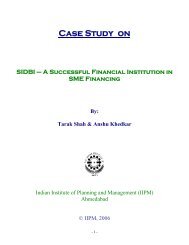
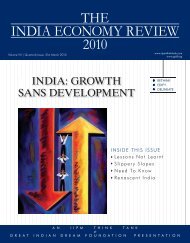
![[Feb 2008, Volume V Annual Issue] Pdf File size - The IIPM Think Tank](https://img.yumpu.com/43961117/1/190x245/feb-2008-volume-v-annual-issue-pdf-file-size-the-iipm-think-tank.jpg?quality=85)
![[June 2008, Volume V Quarterly Issue] Pdf File size - The IIPM Think ...](https://img.yumpu.com/41693247/1/190x245/june-2008-volume-v-quarterly-issue-pdf-file-size-the-iipm-think-.jpg?quality=85)
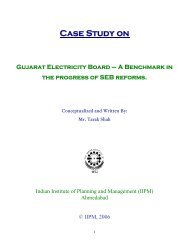

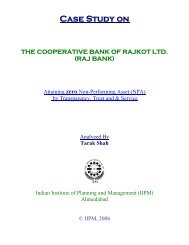


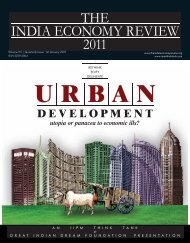
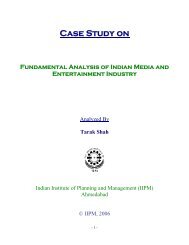
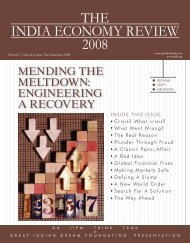
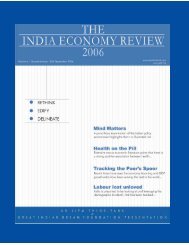
![[Volume VI | Quarterly Issue: 31st May 2009] Pdf File size](https://img.yumpu.com/27796051/1/190x245/volume-vi-quarterly-issue-31st-may-2009-pdf-file-size.jpg?quality=85)